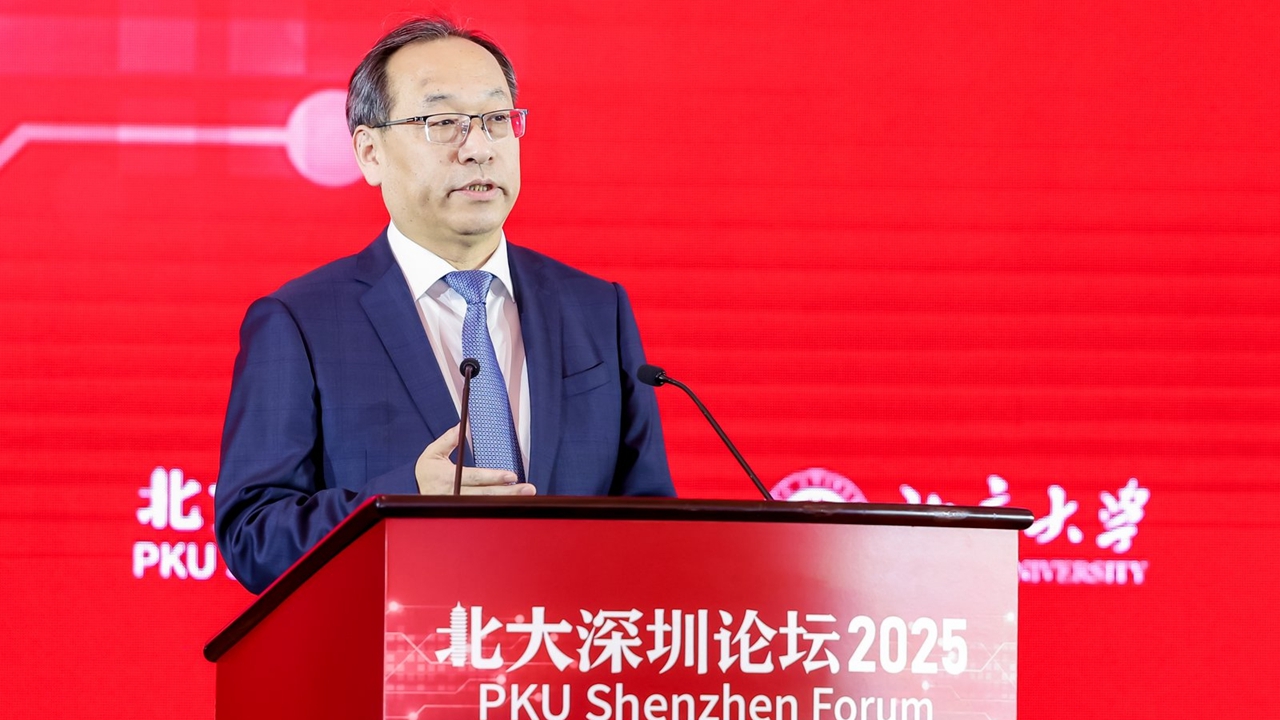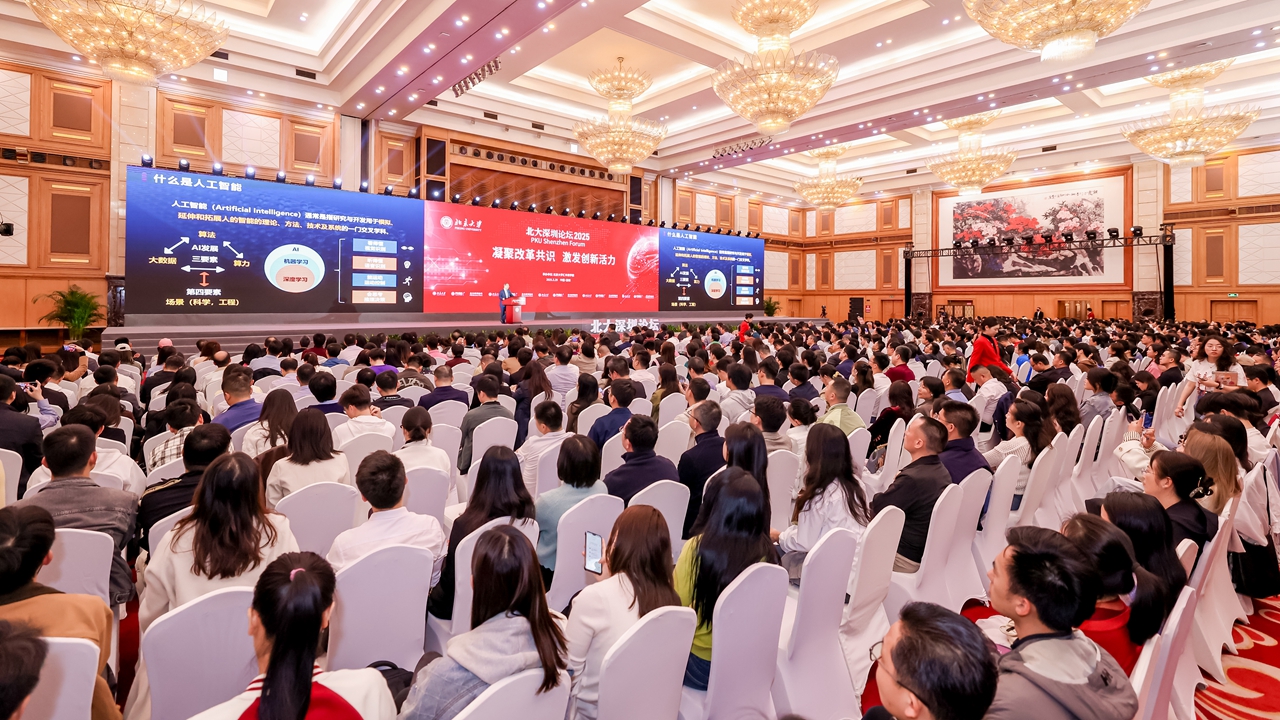Experts weigh in on AI, macro economy at PKU SZ Forum
Writer: Yang Mei | Editor: Zhang Zhiqing | From: Original | Updated: 2025-03-31
The Peking University Shenzhen Forum 2025 (PKU Shenzhen Forum 2025), initiated by the Peking University HSBC Business School (PHBS), was held Saturday afternoon at the Wuzhou Guest House in Futian District.

Initiated by Peking University HSBC Business School, the PKU Shenzhen Forum 2025 kicks off its 2025 edition at Futian’s Wuzhou Guest House on Saturday. Photos courtesy of PHBS
The forum was attended by more than 1,000 participants, including renowned experts and scholars from the fields of economics, technology, and international relations. Under the theme “Building Consensus on Reform, Stimulating Innovation," they convened to delve into the macro economy, discuss scientific and technological innovations, analyze global circumstances, and offer valuable insights into China’s reform and development.
The forum was moderated by Hai Wen, founding dean of PHBS, vice chairman of the Peking University Council, and former vice president of Peking University. In his welcoming speech, Hai discussed the significance of reform and innovation for China’s development, noting, “To deepen reform and constantly innovate has been the cornerstone of China's successful development for more than 40 years, and it will be the fundamental driving force for breaking through difficulties and continuing growth in the future.”

Zhang Jin, member of the Chinese Academy of Sciences and Peking University vice president, delivers a speech at the forum.
Zhang Jin, a member of the Chinese Academy of Sciences, vice president of Peking University, and chancellor of the Peking University Shenzhen Graduate School, delivered a keynote speech titled “AI for Science: The Path of China’s AI Development.”
Zhang explained that “AI for Science” is an emerging research field that leverages artificial intelligence (AI) to accelerate and enhance scientific discovery. He emphasized that “As AI is currently empowering numerous industries and fields, we should also give full play to its role in pushing forward the advancement of scientific research.”
He concluded that China can continuously explore computing power, AI models, data infrastructure, and practical application scenarios. To this end, three pivotal challenges must be addressed — facilitating the digital and intelligent transformation of scientific research, establishing a collaborative, platform-based model for scientific inquiry, and cultivating a new generation of interdisciplinary experts. By doing so, China can forge a unique path in artificial intelligence, promoting development and progress across all sectors of human society.
Academician Li Yang of the Chinese Academy of Social Sciences, also chairman of the National Institution for Finance & Development, gave a keynote speech titled “Analysis of the Macroeconomic Situation.” Li noted that China's macroeconomic policy “toolbox” has shown effectiveness in the first two months of the year, with the economy performing well overall and making steady progress.
However, Li noted that the economy still faces issues including a strong dependence on external demand, weak household consumption, and sluggish private investment. Looking ahead to 2025, Li said it is necessary to earnestly implement the Central Government’s directives by adopting a more proactive fiscal policy and a moderately loose monetary policy.
Wang Yiming, vice chairman of the China Center for International Economic Exchanges, said in a keynote speech that China is at a crucial point in shifting from old to new economic drivers and urgently needs to develop new quality productive forces to promote high-quality economic growth.
During his “Technological Innovation Stimulates New Momentum for High-Quality Development” speech, Wang stated that technological innovation is the core element for developing these new forces. He added that it is necessary to facilitate a positive cycle among education, science and technology, and talent while also enhancing the capacity for original innovation.
Peking University professor Wang Yizhou, a prominent scholar of international relations, argued in a speech that the current “uncertain new normal” in global affairs presents both opportunities and challenges for China. Also vice chairman of the China National Association for International Studies, Wang said that existing knowledge has limitations in the new era and requires adaptation.
He identified China's deepening integration with the world as a key opportunity, while noting challenges in protecting overseas interests and strengthening both hard and soft power. Wang concluded that the outcome of great power competition hinges on internal growth.

The PKU Shenzhen Forum 2025 draws more than 1,000 participants.
Lu Mai, former vice chairman of the China Development Research Foundation, argued in a speech titled “Investing in People — Starting from Early Childhood in Rural Areas” that such investment is crucial for high-quality development and common prosperity. He emphasized that focusing on early childhood development in rural areas, through improved nutrition, scientific early education, and stronger government and social support, is essential for ensuring children receive proper care and education.
This approach, according to Lu, strengthens the development of national human resources and capital accumulation, ultimately promoting social equity, high-quality population growth, and sustainable economic development.
The PKU Shenzhen Forum, established in 2007, was originally an academic forum of the Peking University Shenzhen Graduate School. Since moving off campus 2021, it has broadened its discussions beyond its original focus on economics and finance to include topics such as technology and international relations.